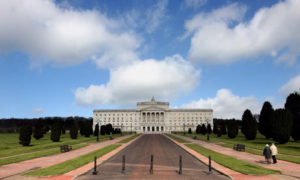Una legge che cerca di emendare la definizione ufficiale di “vittima” per distinguere tra terroristi e civili che hanno perso la vita durante i Troubles è stata avanzata dal DUP

Presentando il Private Members’ Bill (legge proposta da parlamentari o Lord che non sono ministri del governo, ndt) martedì a Stormont, il capogruppo del DUP Peter Weir ha detto che sarebbe sostenuto dalle vittime innocenti di entrambe le comunità dell’Irlanda del Nord.
“Le questioni delle vittime sono tra le materie più sensibili trattate dalla Assemblea dell’Irlanda del Nord”, afferma il parlamentare di North Down.
“Dobbiamo ricordare che quando si parla di vittime ci si riferisce al dolore molto personale e individuale subiti da persone provenienti da tutta la comunità in Irlanda del Nord.
“Attraverso questo Private Members Bill stiamo cercando di modificare l’attuale definizione di vittima che permette ai colpevoli, chiunque essi siano, ad essere parificati alle persone che hanno ucciso o ferito.
“E’ un problema per le vittime dei paramilitari, da qualsiasi parte esse provengano e non sono limitate ad una sola comunità. Questo significa garantire l’accesso ai servizi per le vittime del terrorismo in Irlanda del Nord e non avrà un impatto negativo.
“Oggi è stata solo la prima fase del processo legislativo, giunta dopo un’ampia consultazione lanciata dal mio collega Jeffrey Donaldson prima di dimettersi dall’Assemblea.
“Tutti vogliono vedere l’Irlanda del Nord andare avanti e mettendo il passato dietro di noi, ma nel cercare di affrontare il passato è importante distinguere chiaramente tra coloro che erano impegnati nel terrorismo e le vittime che hanno creato”.
La mossa è stata criticata dallo Sinn Féin, che l’ha descritta come una “divisione” e un “esercizio per sfruttare il dolore e la sofferenza delle vittime”.
Parlando martedì sera, Francie Molloy ha detto: “L’attuale definizione è ampia e inclusiva. E’ un riconoscimento che le vittime ed i sopravvissuti hanno sofferto a causa del conflitto. Il dolore ed il senso di perdita incontrati dalle vittime e dai sopravvissuti sono gli stessi, indipendentemente dalle circostanze.
“Non ci può essere una gerarchia delle vittime. L’attuale definizione è accettata e utilizzata da tutti gli enti pubblici per soddisfare le esigenze delle vittime.
“Questo è cinico, ed i proponenti sanno che non avrà successo. E’ un insulto per le tante vittime della violenza di stato e della collusione. Vittime che i proponenti di questa legge ignorano.
“Riguarda di più le prossime elezioni e le politice dei partiti che vengono passati dai bisogni delle vittime e dei sopravvissuti.
“Lo Sinn Féin si opporrà queste proposte ciniche e riteniamo che non passeranno”.
Tratto da Utv
DUP bill to exclude paramilitary victims
A bill seeking to amend the official definition of a victim to distinguish between terrorists and civilians who lost their lives in the Troubles has been put forward by the DUP.
Introducing the Private Members’ Bill at Stormont on Tuesday, DUP Chief Whip Peter Weir said it would be backed by innocent victims from both communities in Northern Ireland.
“Victims issues are amongst the most sensitive areas which are dealt with by the Northern Ireland Assembly,” the North Down MLA said.
“We must remember when talking about victims we are referring to very personal and individual pain suffered by people from right across the community in Northern Ireland.
“Through this Private Members Bill we are seeking to amend the current definition of a victim which allows perpetrators, whoever they are, to be placed on a par with the people they killed or injured.
“It is an issue for the victims of paramilitaries, from whatever side they may come in Northern Ireland and not merely confined to one community. This is about ensuring access to victim services for the victims of terrorism in Northern Ireland and it will have no negative impact upon carers.
“Today was only the first stage in the legislative process, coming after extensive consultation which was launched by my colleague Jeffrey Donaldson before he stepped down from the Assembly.
“Everyone wants to see Northern Ireland moving forward and putting our past behind us, but in seeking to deal with the past it is important we clearly differentiate between those who were engaged in terrorism and the victims they created.”
The move has been criticised by Sinn Féin, who described it as “divisive” and an “exercise to exploit the grief and suffering of victims”.
Speaking on Tuesday evening, Francie Molloy MLA said: “The current definition is broad and inclusive. It is an acknowledgement that victims and survivors have all suffered due to the conflict. The grief, pain and sense of loss experienced by victims and survivors is the same regardless of circumstance.
“There can be no hierocracy of victims. The current definition is accepted and used by all public bodies meeting the needs of victims.
“This is cynical as the proposers know that it will not succeed. It is an insult to the many victims of state violence and collusion. Victims that the proposers of this Bill ignore.
“It is more about the coming election and putting party politics above the needs of victims and survivors.
“Sinn Féin will oppose these cynical proposals and we believe that they will fail.”